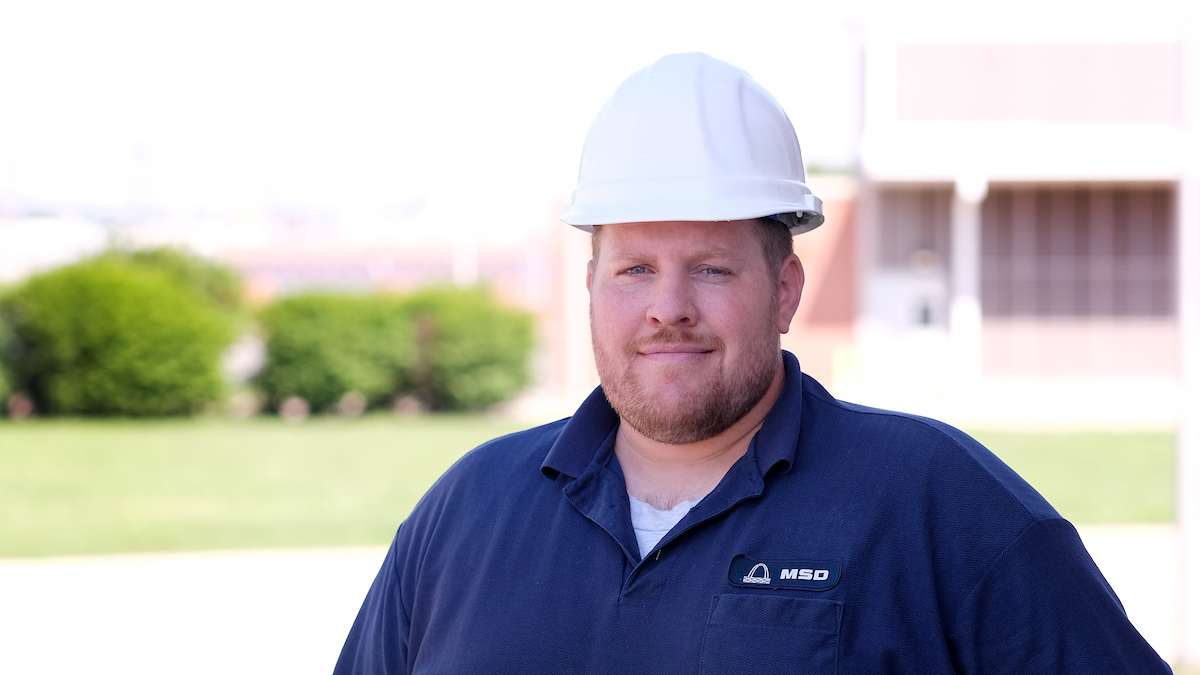
John McCarthy was a student in the joint engineering program from 2007 to 2018. As he worked toward a degree in civil engineering, he maintained his job at the Metropolitan St. Louis Sewer District and became of a father of four. (Photos by August Jennewein)
John McCarthy was only a few years into his career when he started to see it plateau.
A maintenance mechanic trainee armed with an associate’s degree, McCarthy knew his advancement options were limited at the Metropolitan St. Louis Sewer District. His logical step was to become a certified journeyman maintenance mechanic, but from there, only a few other leadership positions would be open to him for the remainder of his time with the organization.
McCarthy had long dreamed of becoming a civil engineer, so the idea of reaching his highest leadership potential while in his 30s didn’t sit well. The St. Louis native began to weigh his options, with earning a bachelor’s degree emerging as a top choice. It came with some hesitation, though, because McCarthy had already attempted an engineering degree at the Missouri University of Science and Technology immediately after finishing high school.
He lacked motivation during his time in Rolla, Missouri, and ended up back home with only friendships to show for his time there. McCarthy would often reflect on those relationships as he considered his career trajectory.
The unexpected death of a friend from Rolla further put his priorities into perspective.
“I went down there, and it reinvigorated that mindset that this is the only thing I have set out to do in my life that I haven’t succeeded at,” McCarthy said.
He started looking frantically for options that allowed him to maintain his full-time job at MSD while also working on his degree. The search led him to the University of Missouri–St. Louis/Washington University Joint Undergraduate Engineering Program in 2007.
“I’m glad that they had something I could do because I thought I was stuck,” McCarthy said. “I didn’t know of any night schools for engineers. I thought I would have to do something drastic, and then I found out they had this program. Sometimes I think things in life just come to you when you need them.”

McCarthy has worked for the Metropolitan St. Louis Sewer District for the last 12 years. He’s earned three promotions in that time and hopes a new bachelor’s degree from UMSL will unlock a few more opportunities.
Even though McCarthy found what he was he looking for, he still feared failure. He decided to enroll in just one calculus class – a familiar foe that he had struggled to pass a few times. McCarthy presumed if he could make it through an accelerated calculus course, he could conquer the rest of the program. The assumption proved true.
“I just lived and breathed calculus for five weeks,” McCarthy said. “I got a 100 on the final and an A in the class. If there ever was a sign, this was it. That was my litmus test. I knew I had it, it was just whether I was driven enough. It was a long way to get there, but that was pretty much the point at which I knew that, yes, I can do it.”
With the initial success, he fully committed and charted out a five-year plan. He took a heavy course load through his first few semesters and did well. Things seemed to be right on pace.
But then his personal life progressed with marriage and children, and he decided to take one or two classes at a time to balance work, school and family life. As he slowed down, his five-year plan dissolved. It eventually transformed into a 10-year schedule, but McCarthy says he never lost faith that he would finish.
He maintained this drive until graduating with a civil engineering degree in May.
“I found out that this is not a sprint, it’s a race,” McCarthy said. “It’s how you finish, not how you start. I had to make sure that I kept on going and that I didn’t end up stopping. A lot of it is just perseverance. It was a goal I set, and I had to just keep on going.”
To maintain a harmonious balance in his life, McCarthy sacrificed quite a bit of sleep. He would begin studying after his wife and children went to bed, which often kept him awake until 2 a.m. Then about once a week, particularly in his final semester, he would pull an all-nighter to catch up on his coursework.
“I never begrudged sleep,” McCarthy said. “I could only see my kids three hours on the nights I didn’t have class. If I had class, I wasn’t there. I would kiss my kids good-night one night, and then I wouldn’t show up for another day.”
While he had to sacrifice some family time in his educational pursuit, McCarthy noted that those around him made sacrifices as well.
“It took a lot of help to get here,” he said. “This wasn’t done in a vacuum. It took a lot of people to get here. My wife had to watch the kids for the last eight years, and this wouldn’t have happened without her.”
To help balance his various responsibilities, McCarthy attempted to tie his studies to work and home life. Some of the projects McCarthy created for school he directly implemented at his job, including a manual he drafted in a technical writing class two years ago.
“I tried to definitely relate everything that I did to either home or work because it helped solidify knowledge,” he said. “It’s one thing to learn something in a book and learn numbers while the resources are there for you. It’s definitely different when you are out in the real world and you have to estimate.”
Now more than a decade after returning to school, McCarthy is thankful for his foresight to pursue a degree. He’s still at MSD and has received three promotions since becoming a journeyman maintenance mechanic. But he’s been locked in at a supervisor position for the last few years.
With a diploma in hand, he’s able to apply for the roles that were out of his reach just two months ago.
“There are real, tangible benefits to a degree,” McCarthy said. “Now that I’m done, just having the degree itself can unlock at least three more doors.”














